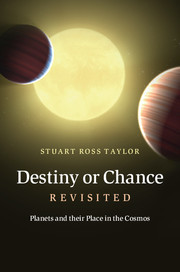Description
Destiny or Chance Revisited
Planets and their Place in the Cosmos
Author: Taylor Stuart Ross
An exciting tour of our Universe exploring our current knowledge of exoplanets and the search for another Earth-like planet.
Language: English
Subjects for Destiny or Chance Revisited:
Approximative price 41.43 €
In Print (Delivery period: 14 days).
Add to cart
Publication date: 09-2012
313 p. · 15.9x23.4 cm · Hardback
313 p. · 15.9x23.4 cm · Hardback
Description
/li>Contents
/li>Biography
/li>
This exciting tour of our Universe explores our current knowledge of exoplanets and the search for another Earth-like planet. Beginning with the basic concepts of planet formation and the composition of the Universe, Stuart Ross Taylor summarises our knowledge of exoplanets, how they compare with our planets and why some stars have better habitable zones. Further sections provide a detailed study of our Solar System, as a basis for understanding exoplanetary systems, and a detailed study of the Earth as our only current example of a habitable planet. The book concludes with a philosophical and historical discussion of topics surrounding planets and the development of life, including why our chances of finding aliens on exoplanets is very low. This is an engaging and informative read for anyone interested in planetary formation and the exploration of our Universe.
Preface; Acknowledgements; List of abbreviations; 1. Prologue; 2. The Universe; 3. Forming planets; 4. The exoplanets; 5. Our Solar System; 6. Earth and Moon; 7. Perspectives; Appendix A. Sources; Appendix B. The geological time scale on the Earth; Appendix C. The geological time scale on Mars; Appendix D. The geological time scale on the Moon; Index.
Stuart Ross Taylor is a trace element geologist and an Emeritus Professor at the Australian National University. His research has covered wide-ranging topics involving trace element geochemistry, from the composition and evolution of the Moon, to tektites and the continental crust of the Earth. He has a DSc from the University of Oxford, is a Foreign Member of the US National Academy of Sciences and has received the Goldschmidt Medal of the Geochemical Society, the Leonard Medal of the Meteoritical Society and the Bucher Medal of the American Geophysical Union. Professor Taylor is the author of 240 scientific papers and nine books, including Planetary Crusts (with Scott McLennan, 2008) which won the 2010 Mary Ansari Best Reference Award of the Geoscience Information Society. He carried out the initial analysis of the first lunar sample returned to Earth at NASA, Houston in 1969 and Asteroid 5670 is named Rosstaylor in his honour.
© 2024 LAVOISIER S.A.S.




